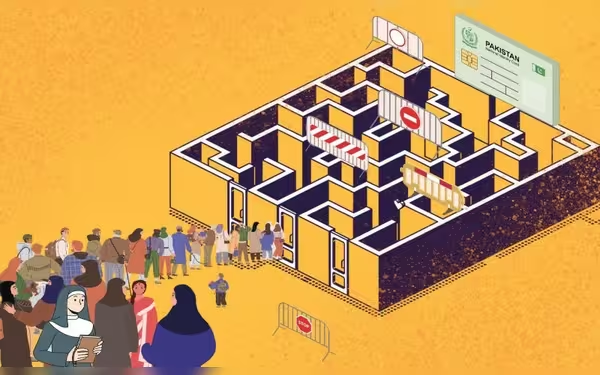Saturday, November 16, 2024 07:32 PM
Pakistan's Identity Crisis: Bureaucratic Hurdles for Women
- Married women face extra hurdles in identity verification.
- Bureaucratic processes reflect outdated societal norms.
- Simplifying documentation can empower women's identities.
 Image Credits: dawn.com
Image Credits: dawn.comThe article discusses the bureaucratic challenges married women face in Pakistan when updating their identity documents, highlighting the need for reform.
In Pakistan, the complexities surrounding identity verification can often feel like a scene straight out of a Kafka novel. The bureaucratic maze that individuals must navigate to update their personal information is not only frustrating but also highlights a significant issue within the system. This is particularly evident for married women, who face additional hurdles when attempting to renew their Computerized National Identity Cards (CNICs).
Shehzeen, a content writer from Karachi, experienced this firsthand when she visited the National Database and Registration Authority (NADRA) three years ago to renew her expired CNIC. After her marriage, she discovered that the process was not as straightforward as she had anticipated. Married women are required to present a variety of documents, including their nikahnama (marriage certificate) and a marriage verification certificate, in order to make any changes to their CNICs. This requirement can be burdensome and often leads to confusion and delays.
The situation raises important questions about the treatment of women in the bureaucratic landscape of Pakistan. Why must married women jump through additional hoops to update their identity documents? The requirement for extra documentation not only complicates the process but also reflects a broader societal issue regarding the recognition of women's identities post-marriage.
Moreover, the Kafkaesque nature of this identity problem extends beyond just the paperwork. It symbolizes a deeper struggle for many women in Pakistan, who often find themselves caught in a web of outdated practices and regulations that do not accommodate their evolving identities. The frustration of navigating such a system can lead to feelings of helplessness and disenfranchisement.
As Pakistan continues to modernize and evolve, it is crucial for authorities to reassess these bureaucratic requirements. Simplifying the process for updating identity documents, especially for married women, would not only enhance efficiency but also promote gender equality. It is time for the system to reflect the realities of contemporary life, where a woman’s identity should not be defined solely by her marital status.
The identity problem faced by married women in Pakistan is a reflection of larger societal issues that need to be addressed. By streamlining the process and removing unnecessary barriers, the government can take a significant step towards empowering women and ensuring that their identities are recognized and respected. After all, a person's identity should be as fluid and dynamic as their life experiences, not confined by outdated bureaucratic norms.













